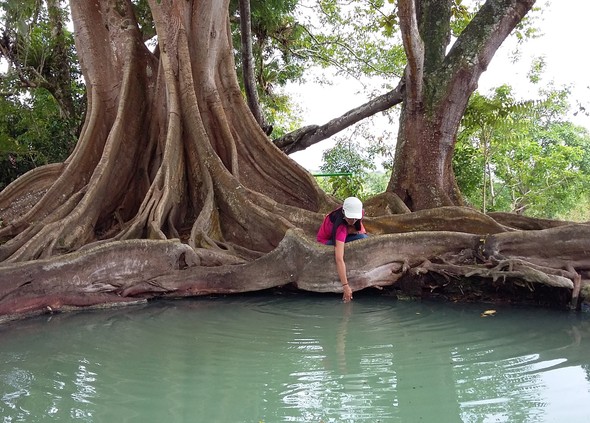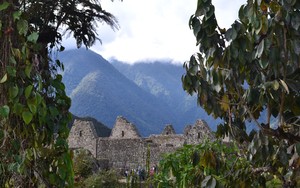By Jed Koball, mission co-worker, Peru

An eco-centric theology places the balanced relationship between humans and the rest of nature at the center of theological reflection. Photo credit: Jed Koball.
¨A misguided anthropocentrism[i] leads to a misguided lifestyle…When human beings place themselves at the center, they give absolute priority to immediate convenience and all else becomes relative. ¨ – Pope Francis, Laudato Si (122)
Pope Francis’ encyclical Laudato Si’, addressing global environmental deterioration as the greatest crisis humanity as ever faced, not only affirms the ecumenical efforts of Joining Hands in addressing the root causes of poverty in the context of a globalizing world, but also challenges us to consider the greater breadth and depth of our work.
Identifying and working to overcome systemic political and human behavioral challenges to a more just world are part of God’s mission for us. We recognize a principle theological challenge, from which such injustices flow: the broken relationship between humans and nature that is rooted in a “misguided anthropocentrism.¨ A move towards an eco-centric theology is a necessary effort we must make to live into the beloved community of all creation that God wills for us. Our global partners can help us do just that.
Much of Christian theology is an attempt to define relationships: God and humans; Creator, Christ and Holy Spirit; woman and man; landowner and tenant; debtor and creditor; Jew and gentile; among so many others. In the work of defining them, some relationships are prioritized in doctrine and/or in praxis. The great commandment to love God with all your heart, soul and strength (Deuteronomy 6:5), and a second commandment just like it to love your neighbor as yourself (Mark 12:28-31, Matthew 22:36-40, Luke 10:27-28) gives some credence to the ranking of the relationships between God, human and his/her neighbor as chief among them.
However, it is our own anthropocentric lens, which we bring even to reading the Bible that guides us to make leaps such as “neighbors” are only human neighbors. So often marginalized among the web of relationships that shape our existence are the relationships between God and nature and humanity and nature that are absolutely fundamental to abundant life. Such is the way of an anthropocentric theology that fails to consider the equally ¨good¨ value of all parts of creation, from light to water to living creatures, and even humans themselves: ¨God saw everything that he made, and indeed, it was very good.¨ (Genesis 1).
Pope Francis is clear in his encyclical that ¨a misguided anthropocentrism need not necessarily yield to ´biocentrism[ii]´ (a predecessor to eco-centrism[iii]), for that would entail adding yet another imbalance, failing to solve present problems and adding new ones. Human beings cannot be expected to feel responsibility for the world unless, at the same time, their unique capacities of knowledge, will, freedom and responsibility are recognized and valued.¨ (118)
While defining a distinct role for humanity based on unique capacities is paramount to confronting the present situation in which we find ourselves, I fail to see how it precludes the move towards an eco-centric theology in which the relationship between God and all life systems stand at the center of theological reflection.
An eco-centric theology is crucial for the promotion and preservation of equality in value and a subsequent balance and harmony in the functioning of all of creation. In theological terms, abundant life is the hope and promise for all of creation, not just humans. And when we fail to recognize both the purpose and the right of nature to glorify God, then we lend ourselves to a misinterpretation of Scripture in which ¨dominion over…every living creature on the face of the earth¨ becomes a license to usurp the place of God, create hierarchical structures, and dominate over nature in the name of development and progress – a very slippery slope that leads not only to the destruction of the natural world but also to the de-humanizing of others: sexism, racism, slavery, genocide, etc. Yes, a distinct role for humans must be shaped and even prioritized in our theological work, but it must be a theology that centralizes the distinct role of natural ecosystems that support life.

The discovery of ancient ruins continues to generate conversation about the spiritualities and their practices of Andean indigenous populations that may have lessons to offer to modern society and the practice of Christianity today. Photo Credit: Jed Koball.
It is this very struggle for harmony that shapes the practices of our Joining Hands partners in Peru. In the context of its ecologically mega-diverse territory in which indigenous spiritualties evolved, we find today the beginnings of a movement expressed politically in such issues as a moratorium on genetically modified organisms (GMOs) in order to protect bio-diversity, zoning laws to protect headwaters and watersheds, and an effort to promote the rights of Mother Earth herself.
Deeper still, we find the theological work of reconciling Christianity with the indigenous spiritualties it once tried to obliterate. In every time and place, Christianity has interacted with culture (for example, translating holy scripture into local languages), so while it may be startling for Western Christians to consider the wisdom in other spiritual expressions, our brothers and sisters and mission workers around the globe have experienced a faithful Christianity that embraces local context. This may be particularly true when it comes to learning afresh what a Christian ethic of caring for creation can be.
Gaining insight from our brothers and sisters around the world and in our mission partnerships, we find a new ethic of respect, mutual learning, and care includes human neighbors as well as all creation. Until we join in this spiritual and faithful work, our efforts on the political and human behavioral level may be in vain. The peoples our religious predecessors once tried to silence may be the very ones who can teach us something more about the beloved community of all creation God wills for us. May we all move forward, together, towards the abundant life offered by God to all people and all the earth.
[i]Anthropocentrism: the belief that human beings are the central or most significant species on the planet (in the sense that they are considered to have a moral status or value higher than that of other lifeforms)
[ii]Biocentrism: a political or ethical stance which asserts the value of non-human life in nature.
[iii]Ecocentrism: a point of view that recognizes the ecosphere (ecosystems and the interconnectedness of all life) as central in importance, and attempts to redress the imbalance created by anthropocentrism
![]() You may freely reuse and distribute this article in its entirety for non-commercial purposes in any medium. Please include author attribution, photography credits, and a link to the original article. This work is licensed under a Creative Commons Attribution-NonCommercial-NoDeratives 4.0 International License.
You may freely reuse and distribute this article in its entirety for non-commercial purposes in any medium. Please include author attribution, photography credits, and a link to the original article. This work is licensed under a Creative Commons Attribution-NonCommercial-NoDeratives 4.0 International License.
Categories: Environment, World Mission
Tags: environment, Jed Koball, Joining Hands. Pope Francis, Peru
Ministries: World Mission